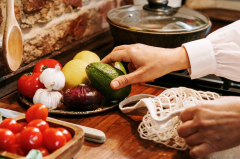Ageing well isn’t just genetic—daily diet and lifestyle choices can support your body’s natural longevity mechanisms.
The way we age is influenced by far more than just our genes
Everyday choices we make, especially what we eat, play a vital role in how we feel, move and function as the years go by. Emerging science continues to highlight how certain foods and lifestyle habits can slow down biological ageing, reduce inflammation and support brain and heart health, to help us stay strong, vibrant and energised well into our later decades.
In this article, we explore the importance of choosing organic produce for healthy ageing and how antioxidant-rich foods, such as purple berries, pomegranates, wild salmon, walnuts, turmeric and green tea, along with key nutrients and phytochemicals, such as vitamin C, omega-3s, alpha-lipoic acid, resveratrol and urolithin A promote a longer, healthier life.
We’ll take a closer look at how these foods and protective compounds support mitochondrial health, reduce senescent cells, lower inflammation and oxidative stress, and stimulate autophagy, the body’s internal clean-up system linked to longevity and better health. You’ll also discover the importance of a healthy gut microbiome in ageing well, plus enjoy three delicious recipes designed to help you age more powerfully, one nourishing bite at a time.
Understanding the key factors behind ageing
Ageing is shaped by a complex interplay of factors, including our genes, diet, lifestyle habits and environmental exposures. While we cannot change our genetic makeup, we have significant influence over how our genes are expressed through the daily choices we make. This is known as epigenetics, the way our environment and behaviours can switch genes on or off.
Several key drivers have been identified that can accelerate ageing and increase the risk of age-related diseases. These include chronic inflammation, oxidative stress, nutrient deficiencies, poor sleep and unrelenting stress. However, one often overlooked factor in ageing well is the importance of fostering strong social connections. Engaging with a supportive community can reduce stress, improve mood and provide a sense of purpose, all of which are essential in maintaining physical and mental health as we age.
Inflammageing
Inflammageing is a term used to describe the chronic, low-grade inflammation that naturally develops as we age. Unlike acute inflammation, which is a short-term protective response, inflammageing is persistent and gradually damages tissues and organs. This ongoing inflammation is believed to contribute to many age-related diseases, including heart disease, type 2 diabetes, Alzheimer’s disease, osteoarthritis and certain cancers.
Scientists have found a strong correlation between inflammation levels and a person’s lifespan. A study published in The Lancet found that low levels of inflammation are a powerful predictor of longevity in people who live beyond 100 years of age.
Several factors drive inflammageing, including:
- Accumulation of senescent (aged, non-functioning) cells
- Long-term exposure to environmental stressors (e.g. pollution, poor diet)
- Changes in gut microbiota
- Declining immune regulation
- Oxidative stress
A lifestyle rich in antioxidants, regular movement, good sleep, stress management and gut health can reduce inflammageing and support healthier ageing.
How antioxidants support healthy ageing
Antioxidants slow the ageing process by shielding our cells from oxidative stress—a key factor in premature ageing and inflammation. They support skin, brain and heart health, and protect our mitochondria.
Key foods high in antioxidants include:
- Dark berries, pomegranates, kiwi, citrus
- Cruciferous vegetables (e.g. broccoli, kale, red cabbage)
- Turmeric, green tea, ginger, raw cacao
- Oily fish (e.g. salmon, sardines)
- Cold-pressed oils (e.g. olive, flaxseed, avocado)
Benefits of plant polyphenols
Plant polyphenols are powerful antioxidants found in fruits, vegetables, tea and spices. They help:
- Regulate blood su





